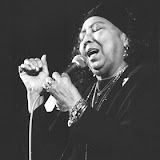Pianist Diana Krall knows how to handle pop music
Concert: Diana Krall (piano, vocals), with Anthony Wilson (guitar), Robert Hurst (bass), and Peter Erskine (drums).
Heard: October 29, 2004 at the Concertgebouw, Amsterdam.
By Bart Jippes
There is a yawning gap in pop music left by artists like Dusty Springfield, Joni Mitchell, and Carole King. And this gap is filled, horrifying to jazz purists, by old stars like Tony Bennett, by popjazz-musicians like Norah Jones and Jamie Cullum and by the thirty-something Diana Krall. Her repertoire used to consist of standards, but since she married rock chameleon Elvis Costello last year, she has adopted material from the ‘Great American Rockbook’. Last night this resulted in a wonderful cover of Tom Wait’s Temptation, including a beautiful, subtle guitar solo from Anthony Wilson. Krall’s interpretation of this temptation was an unreachable phenomenon, like that of a girl in an attic room dreaming that it will happen to her once.
“I was born in British Columbia, where it rains all the time,” told Diana Krall her audience in the pause between two songs last night, “and I love it”. Krall might have moved from that Canadian province, British Columbia never left Krall. Her voice has, in spite of the light hoarseness, something standoffish, which inclines to smoothness on the records, but there was no sign of that whatsoever in the Concertgebouw. This was even more striking, because the hall amplifier was awful. Opposed to the usual situation at pop concerts, where the artist doesn’t have the problems of monitor speakers and can hear himself clearly due to wireless invisible boxes, here the situation was as follows: each musician had a monitor in front of him, and the audience was expected to hear the music through a couple of midway placed hanging boxes. Therefore, the public heard the original sounds from the band, together with the echoing sounds from the monitors, with on top of that the music from the hanging boxes. Even worse, the s-sounds were so awfully hissing that the audience doubled up because the ears felt like they were being sandblasted. And in the more loud passages, the grand piano sounded like the felt was replaced by metal.
Happily, all these cons were compensated by the pros, for example by the (with the exception of the first few bars) wonderfully tight playing band. Erskine and Wilson starred on Devil May Care, and Krall played a marvellous solo on On The Sunny Side Of The Street.
As a jazz singer, Krall can’t mach with her great predecessors, but her pop songs made an impression last night. Much better than on her latest record she played Joni Mitchell’s Black Crow, with nice guitar playing by Wilson, and most of all on the song which Costello once wrote for Chet Baker, Almost Blue.
It was beautiful as well to see how Krall’s past as a bar pianist came through when she hit a last note at the right end of the baby-Steinway and grasped with her hand a bottle of water on the ground in the same movement.
<<
